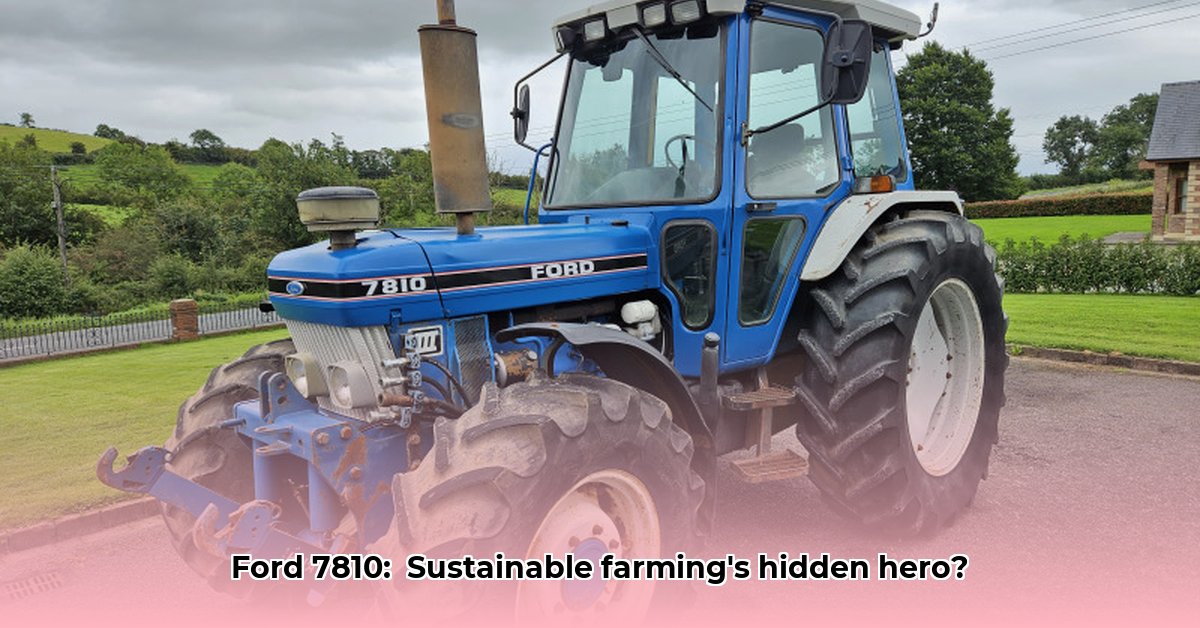
The Enduring Appeal of a Simple Machine
The Ford 7810 tractor, a stalwart of the late 1980s and early 1990s, might seem like a relic of the past. Yet, its story offers compelling insights into sustainable farming practices. This case study explores how this seemingly outdated machine challenges our assumptions about modern agricultural technology and offers valuable lessons for a more environmentally conscious future. Could a simpler, more durable machine hold the key to a more sustainable approach to farming? For more information on Ford tractors, check out this dedicated resource.
"The Ford 7810 wasn't designed with sustainability in mind," says Dr. Anya Sharma, Agricultural Engineer at the University of California, Davis. "But its inherent durability and simplicity inadvertently promoted practices that, in hindsight, align remarkably well with modern sustainability goals." This aligns with the growing focus on the importance of repairability and longevity in agricultural machinery.
Simple Design, Sustainable Impact
The Ford 7810's straightforward design is its strongest selling point from a sustainability perspective. Unlike modern tractors brimming with complex electronics, the 7810's mechanical simplicity translates to easier and cheaper repairs. This significantly extends its lifespan, reducing the need for constant replacements—a significant source of waste and environmental impact. Isn't it time we considered the long-term implications of our choices on the earth's resources?
The Economics of Repair vs. Replacement
The cost savings associated with repairing a 7810 versus replacing a modern tractor with complex electronics are substantial. This simplicity also empowered local mechanics, fostering a valuable skillset and reducing reliance on specialized technicians. Furthermore, the readily available parts for the 7810 further contribute to its overall sustainability. This contrasts sharply with some modern tractors, where specialized parts and long wait times for repairs can drastically affect the farmer's operational efficiency.
Fuel Efficiency: A Comparative Analysis
The 7810's 105-horsepower engine, while powerful for its time, was less potent than modern tractors. This seemingly minor detail could translate to lower fuel consumption per acre for specific tasks. However, direct comparisons require careful consideration of varying farming practices and field conditions. Further research comparing the fuel efficiency of the Ford 7810 with modern tractors could be instrumental in defining the true impact of this legacy machine. Wouldn't such data help inform the design of future, more sustainable farming equipment?
A Legacy of Durability
It's not uncommon to encounter a Ford 7810 still functioning decades after its initial deployment. These tractors, built for resilience, represent a stark contrast to the often shorter lifespans of modern equipment. This resilience underlines the inherent value of prioritizing quality and durability over disposable consumption. This longevity presents a compelling argument for re-evaluating our purchasing habits and prioritizing longer-lasting machinery.
Key Takeaways and Future Directions
The Ford 7810 case study reveals pivotal lessons for sustainable agriculture:
- Durability and Longevity: Prioritizing the design and manufacturing of durable, long-lasting equipment drastically reduces waste and reliance on constant replacements.
- Simplicity and Repairability: Simple designs ease maintenance and repairs, saving both time and money, and enabling local mechanics to sustain the machines.
- Holistic Assessment: Evaluating the entire lifecycle cost, from manufacturing to disposal, is crucial in determining the true environmental impact of agricultural machinery.
The information presented in this case study suggests that further research is necessary to fully quantify the Ford 7810’s impact on sustainable farming. Specifically, comparative studies focusing on fuel efficiency, repair costs, and parts availability are needed to provide a thorough evaluation. Such research would allow us to refine and replicate the 7810's design principles in future agricultural machinery, enabling a transition towards a more environmentally responsible agricultural industry.
This investigation into the Ford 7810 serves as a compelling reminder: sometimes, the most effective solutions are the simplest. By embracing the lessons from simpler times, we can build a more sustainable future for agriculture.